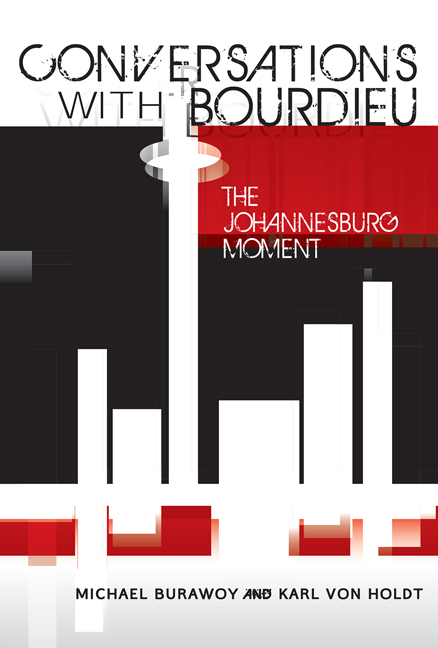Book contents
- Frontmatter
- Contents
- Abbreviations and acronyms
- Preface
- Prologue The Johannesburg Moment
- Acknowledgements
- CONVERSATION 1 SOCIOLOGY AS A COMBAT SPORT
- CONVERSATION 2 Theory and Practice
- CONVERSATION 3 CULTURAL DOMINATION
- CONVERSATION 4 COLONIALISM AND REVOLUTION
- CONVERSATION 5 PEDAGOGY OF THE OPPRESSED
- CONVERSATION 6 THE ANTINOMIES OF FEMINISM
- CONVERSATION 7 INTELLECTUALS AND THEIR PUBLICS
- CONVERSATION 8 MANUFACTURING DISSENT
- Burawoy Meets Bourdieu
- The Margin of Freedom
- Epilogue Travelling Theory
- Bibliography
- Index
Burawoy Meets Bourdieu
from CONVERSATION 8 - MANUFACTURING DISSENT
Published online by Cambridge University Press: 20 April 2018
- Frontmatter
- Contents
- Abbreviations and acronyms
- Preface
- Prologue The Johannesburg Moment
- Acknowledgements
- CONVERSATION 1 SOCIOLOGY AS A COMBAT SPORT
- CONVERSATION 2 Theory and Practice
- CONVERSATION 3 CULTURAL DOMINATION
- CONVERSATION 4 COLONIALISM AND REVOLUTION
- CONVERSATION 5 PEDAGOGY OF THE OPPRESSED
- CONVERSATION 6 THE ANTINOMIES OF FEMINISM
- CONVERSATION 7 INTELLECTUALS AND THEIR PUBLICS
- CONVERSATION 8 MANUFACTURING DISSENT
- Burawoy Meets Bourdieu
- The Margin of Freedom
- Epilogue Travelling Theory
- Bibliography
- Index
Summary
Like the gift, labour can be understood in its objectively twofold truth only if one performs the second reversal needed in order to break with the scholastic error of failing to include in the theory the ‘subjective’ truth with which it was necessary to break, in a first para-doxal reversal, in order to construct the object of analysis. The objectification that was necessary to constitute wage labour in its objective truth has masked the fact which, as Marx himself indicates, only becomes the objective truth in certain exceptional labour situations: the investment in labour, and therefore miscognition of the objective truth of labour as exploitation, which leads people to find an extrinsic profit in labour, irreducible to simple monetary income, is part of the real conditions of the performance of labour, and of exploitation.
Bourdieu (2000 [1997]: 202)The defining essence of the capitalist labor process is the simultaneous obscuring and securing of surplus value. How does the capitalist assure himself of surplus value when its production is invisible?
Burawoy (1979: 30)Tucked away toward the end of Bourdieu's masterpiece, Pascalian Meditations, are four startling pages under the heading ‘The twofold truth of labour’ (Bourdieu, 2000 [1997]: 202–5). They are startling, firstly, because they deal with the labour process, a topic Bourdieu rarely broached, and, secondly, because his interpretive framework follows Marxist orthodoxy, a framework he generally dismissed as anachronistic and misguided.
His argument is presented in typically intricate form in the quotation above. Let me translate. In constituting the object of knowledge – i.e. the notion of wage labour – Marx breaks with the subjective (lived) experience of workers that they are paid for a full day's work, for eight hours in an eight-hour day. In reality, workers are exploited and only receive wages that are equivalent to a portion of the working day, say five hours, leaving three hours as surplus labour, which is the basis of profit. So far, this is straightforward Marx. But, says Bourdieu, it is not enough to make this first break – first reversal – with lived experience to produce the objective truth of exploitation, it is further necessary for theory to make a second break, a second reversal, this time against the ‘objective truth’ in order to reincorporate the ‘subjective truth’ – the lived experience of workers.
- Type
- Chapter
- Information
- Conversations with BourdieuThe Johannesburg Moment, pp. 175 - 197Publisher: Wits University PressPrint publication year: 2012

